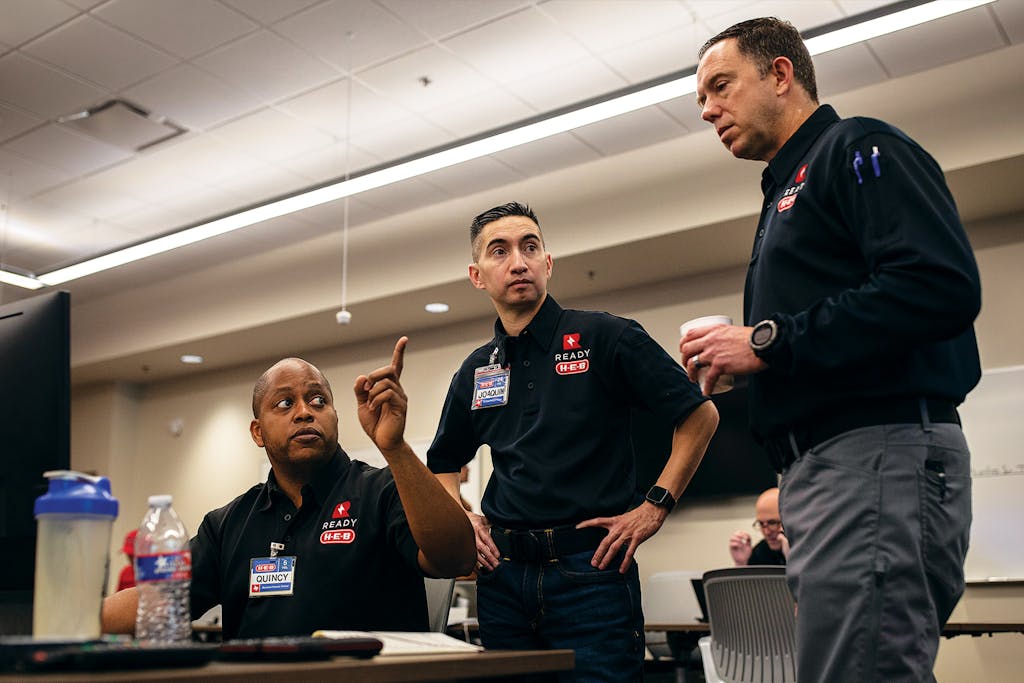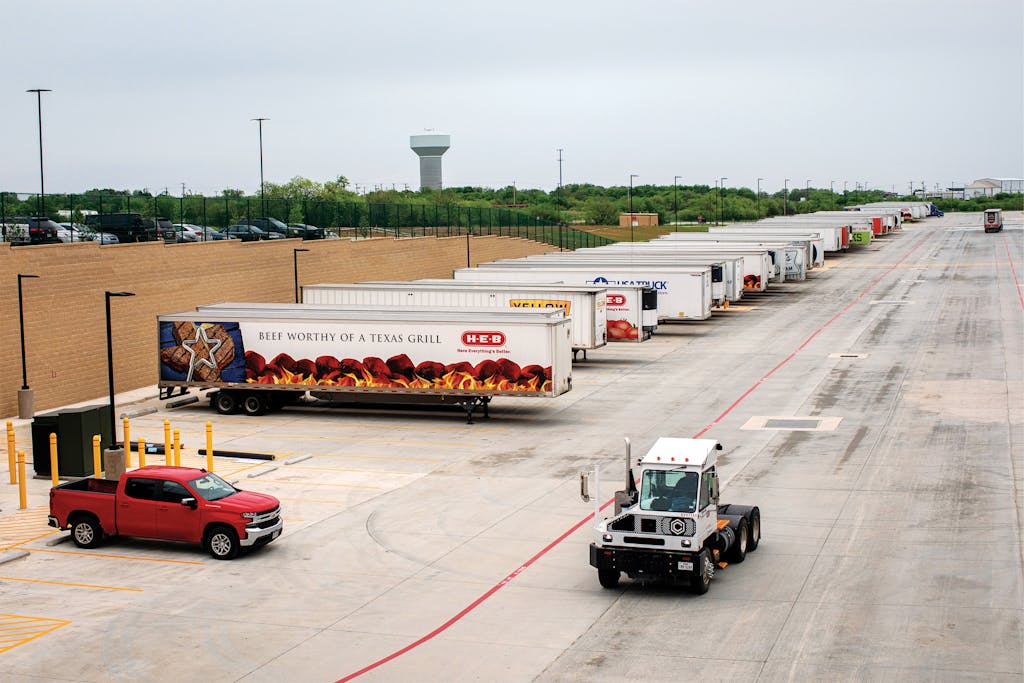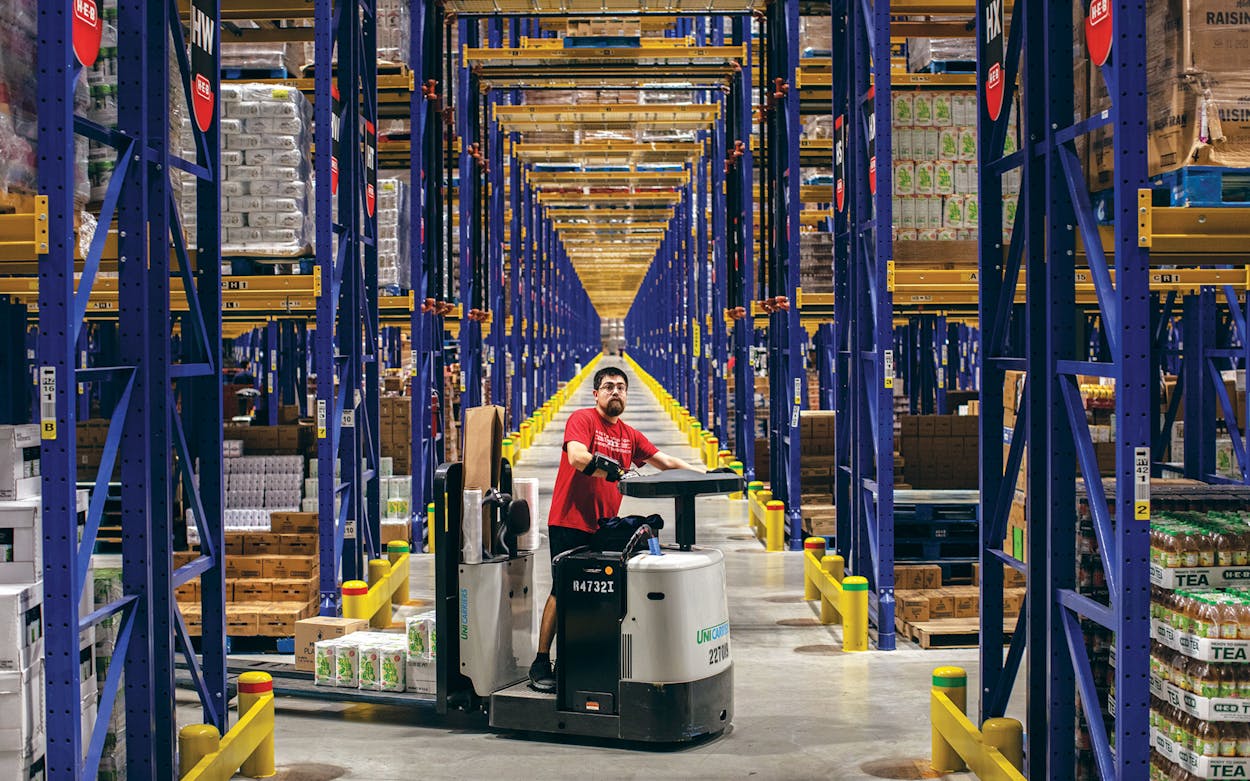Back on February 2, the first coronavirus death outside China was reported in the Philippines. That same day, Donald Trump appeared on Sean Hannity’s show on Fox News to say that the United States had “pretty much shut it down coming in from China.” And in San Antonio, Justen Noakes, the director of emergency preparedness for H-E-B, dusted off a pandemic response plan the supermarket chain had developed more than a decade earlier. Noakes and a handful of the company’s department heads met at H-E-B’s downtown headquarters. Sitting around a conference table, the group ran a simulation, war-gaming a dire scenario: an outbreak of a deadly infectious disease in Texas.
“We introduced the concept of COVID-19 and what it would look like when it came to Texas,” Noakes said. “That gave us a moment to pause to think about how it would impact our operations and what we would do to respond.” From there, teams across H-E-B got to work updating the pandemic plan that Noakes had developed in 2009, when the San Antonio suburb of Cibolo became the first place in Texas with confirmed cases of H1N1, commonly known as swine flu. The emergency management division studied how the Chinese government had responded in the early days of the coronavirus outbreak and projected how social distancing measures such as metering customer entry and erecting plexiglass partitions might be implemented. Members of the supply-chain team focused on keeping products in stock. The personnel department studied how Chinese retailers were managing a workforce that was getting sick. The product team looked to Europe for insight into changes in consumer behavior as customers began self-isolating. Within a couple weeks of the tabletop exercise, H-E-B had a plan.
A month later, in mid-March, as the pandemic began to surge in the United States and political leaders struggled to respond, H-E-B emerged as an unlikely model of foresight, planning, and competence. Executives cut store hours in order to give employees more time to stock shelves, and rolled out a pay bump of $2 an hour, which gave way to permanent raises for most hourly employees in June. Purchase limits were imposed on in-demand products ranging from beef to toilet paper. The company established crowd control and social distancing procedures and tapped partners in other industries—such as restaurant suppliers and beer distributors—to haul products to its stores to avoid shortages. These steps often came days or even weeks before other large supermarket chains implemented similar measures. After Texas Monthly published a web story in March on H-E-B’s pandemic planning, Arnold Schwarzenegger tweeted that the company’s response was “a masterclass in preparation and being ready to support your community.”
H-E-B’s success stands in contrast to the way the Trump administration and some state governments have handled the pandemic. Americans struggled to get tests and spent much of March and April trying to parse rambling, often contradictory presidential press conferences for official updates about the disease; H-E-B, which employs a chief medical officer, rolled out a dedicated coronavirus hotline its workers could call for screenings and health information. Coronavirus swept through meatpacking plants across the nation, including in Texas, this spring and summer; H-E-B, which operates its own meatpacking facilities, applied the same social distancing protocols it implemented in stores and avoided a single case for nearly three months, even as production ramped up to a 24/7 cycle to meet the needs of customers. (An H-E-B spokesperson acknowledged that some workers tested positive in June and July but wouldn’t give a precise number, adding that none of the infections have been linked to the plants.) All of which led to questions: How had Texas’s favorite grocery chain, beloved for its deep bench of house brands and commemorative Selena tote bags, emerged as an example of planning and readiness? How was a regional supermarket company better prepared for a global pandemic than its larger competitors and even the federal government?

In 2017, as Hurricane Harvey ravaged the Gulf Coast, the city of Beaumont lost water pressure, leaving residents with empty taps as floodwaters rose around them. City officials called on the state to help restore service but were told that assistance wasn’t immediately coming. Officials with the Federal Emergency Management Agency, meanwhile, explained that it would take days to get past the flooding. That was when Noakes got a call from someone working for the city. “He said, ‘I know that I’m asking a lot, but what can H-E-B do to get water to the citizens of Beaumont?’ ” Noakes recalled. Soon, images of H-E-B semitrucks hauling tanks of water into storm-ravaged Beaumont went viral on social media, and H-E-B’s disaster response became a meme among Gulf Coast residents. “I’ll see your FEMA and Red Cross,” one declared, “and raise you my Texas grocery store.”
H-E-B had begun developing a deeper understanding of the role it could play as an emergency responder in 2005, after Hurricane Rita struck southeast Texas, said Noakes, who has been with the company since 1994. “We learned early on after Hurricane Rita that power is very important to keeping H-E-B stores running,” he said. So the company increased its fleet of mobile generators. Flooding taught the company about the importance of having potable water sources—hence the water tankers. Noakes took on his current role as director of emergency preparedness in 2008, watching for hurricanes, tornadoes, flooding, and other potential disasters in Texas. “When you feed half the people in Texas, it’s your responsibility to be open during times of crisis,” Noakes said.
In 2017, following Hurricane Irma, H-E-B partnered with San Antonio Spurs legend Tim Duncan to deliver 400,000 pounds of food to the Virgin Islands, where the NBA star was born. Last fall, after tornadoes swept across Dallas, leaving a fifteen-mile trail of destruction in their wake, the company sent its mobile kitchen to the city to feed storm victims.
“We are in a year-round state of preparedness for different emergencies,” H-E-B president Craig Boyan said. It helps that the company has an emergency preparedness department, he noted: if you’re constantly thinking about those things, you’re more likely to be able to address them.
“Almost everything they do is proprietary to H-E-B,” said Jon Springer, the executive editor of the supermarket trade publication Winsight Grocery Business. “So when a situation like the coronavirus comes up, they’re better able to use their own resources, data, and people to coordinate a response than someone who is relying on what the federal government is telling them.”
That internal planning has manifested itself in specific ways during the pandemic. “Manufacturing so much of what we sell has been a real source of strength, as we’ve been able to serve our customers in ways that other competitors maybe haven’t been able to do,” said Martin Otto, H-E-B’s chief operating officer. By running its own meatpacking plants, for example, the company has been able to avoid the shortages that some other grocers have faced.


Inside H-E-B, executives and store managers alike promote a philosophy of corporate self-reliance, built around a mythology that dates back to the company’s founding in Kerrville in 1905. According to Connie Barrera, who manages the H-E-B Plus in Schertz, just north of San Antonio, this corporate culture gets inculcated in employees from the moment they first put on their name tags. “Some of it is storytelling and setting expectations,” she said. One possibly apocryphal story that gets passed around a lot involves an unfortunate warehouse worker in San Antonio who once failed to deliver water to Randolph Air Force Base during an emergency. The president of the company personally intervened. “It was made abundantly clear what [the employee’s] responsibility was,” Barrera said.
To be sure, H-E-B has faced challenges throughout the COVID-19 crisis. Until it was stabilized in June, the online system, through which customers can order groceries for curbside pickup or delivery, offered a spotty experience. That same month, as Governor Greg Abbott aggressively rolled back public safety measures, H-E-B stopped mandating that customers wear masks, citing the difficulty in enforcing such a rule without a statewide order. (When local officials in parts of Texas began imposing requirements in late June, H-E-B stores in those locations put mask rules back in place.) And the company’s temporary pay hike of $2 an hour was instituted after employees circulated an online petition demanding a raise, amid the dangers and privations of working long, grueling shifts during a pandemic. In early July, H-E-B employees were disappointed to learn that a generous temporary discount on groceries would be expiring. The next day, the company sent out an electronic coupon code for a free mango, a perk that some workers described as demeaning.
Despite the stumbles, H-E-B is proud of its track record: as other meat production facilities have become COVID-19 vectors, H-E-B’s plants have been almost completely disease-free. And unlike other large retailers—including Kroger, Target, Walmart, and Whole Foods—H-E-B maintains an online list of when each store last had an employee test positive. Most crucially, its supply chain remains strong, ensuring that shelves are stocked with staples.
But this story, unfortunately, isn’t over just yet. The pandemic has evolved from a new emergency demanding an immediate response to an evolving crisis that’s changing how Americans eat, work, and shop. With that comes a new challenge: How does H-E-B ensure that stores are open, stocked, and safe in a world where the current crisis could drag on indefinitely—and another crisis could come at any time?

For customers, the supermarket experience has dramatically transformed over the past several months. Early in the pandemic, admission to stores was regulated, with shoppers standing in a line outside, six to eight feet apart, waiting to be allowed in. In March and April, the toilet paper aisle looked like a Soviet-era state-run food store. As the summer has progressed, customers have grown used to paying more for meat. The employees at the register wear masks and stand behind a plexiglass shield. Customers are reminded to use hand sanitizer and are required to wear masks.
For some shoppers, dealing with all of that seemed too risky or stressful, which led to a boom in online grocery orders. Those systems, which had been in place at various supermarket chains, including H-E-B, got a serious workout in the early days of the pandemic. Jag Bath, H-E-B’s chief digital officer, told Texas Monthly in April that the company was caught off guard by the shift. “We are seeing increases in demand for curbside and home delivery that, quite frankly, we were not expecting to see for a number of years,” Bath said. Customers often experienced long waits to schedule pickups and deliveries, frequent shortages on products, deliveries, and only partially fulfilled orders. (You might find yourself with hot dogs but no buns, for example.)
Even as H-E-B’s digital and e-commerce services have improved, the next crisis is looming: threats to the supply chain. The runs on yeast, flour, and toilet paper have largely come to an end, at least for now, but circumstances could change. “The public responds to the information they receive, so the consumer might start feeling a little bit of anxiety, like, ‘I need to go buy some more groceries because something’s happening,’ ” said Doug Baker, the vice president of industry relations for the supermarket trade organization Food Marketing Institute. “We saw that happening all the way through this crisis, where we had unprecedented demand, then it started to abate and come down, and then the news cycle spikes demand.”
As the summer harvest season got underway, cases of COVID-19 began ticking up in Arizona, California, Florida, Georgia, and Texas, states that collectively produce about 85 percent of the nation’s vegetables. Outbreaks at meat production facilities have led to shutdowns, consumer panic buying, and an increase in meat prices. In early May, more than a thousand Wendy’s restaurants stopped serving hamburgers because of beef shortages, and by the end of that month, U.S. pork production for 2020 was down 6 percent from the previous year. So far, H-E-B has maintained its stock of meat products, but the spread of COVID-19—or another crisis—could further disrupt availability.
The nightmare scenario for Texas this summer could be an uncontrolled outbreak of COVID-19 across the state as a hurricane bears down on the Gulf Coast. If a storm were to make landfall in Texas, folks on the coast might find themselves looking back with nostalgia to the days when there was just a pandemic to worry about.
“There would be a demand along the coastal areas for some of the same product types that would be demanded for a surge in the virus as well. That would be the most challenging scenario,” said Otto, H-E-B’s chief operating officer.
In June, Justen Noakes led another tabletop exercise to game out such a scenario. (This time, the team met via Zoom, with dozens of participants from across the company.) Noakes came away optimistic. Even in the event of a hurricane, H-E-B would be able to keep sought-after essentials on shelves across Texas and also meet customer needs in areas affected by the storm, all while maintaining safety measures for employees and shoppers. In recent months, H-E-B has invested in more warehouse space, purchased additional trailers for hauling products, and increased capacity in its manufacturing facilities. Noakes said that many of “the lessons learned from this round of COVID” are now just part of running a business that has to be ready for natural disasters at any time. Hurricane? Pandemic? The doors must stay open.
The past few turbulent months have been more than just a logistical challenge for H-E-B. They have put the company’s philosophy—that customers should see it as more than just a grocery store—to the test. When H-E-B rolled out its slogan, “No Store Does More,” a decade ago, it may not have anticipated just how high it had set the bar.
This article originally appeared in the August issue of Texas Monthly with the headline “No Store Did More.” Subscribe today.










